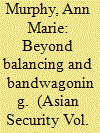| Srl | Item |
| 1 |
ID:
093983


|
|
|
|
|
| Publication |
2010.
|
| Summary/Abstract |
This article examines Thailand's response to China's rise. Contrary to predictions made by power transition theories that states respond to rising powers by balancing against or bandwagoning with them, Thailand has reacted to China's rise with no fundamental change in its alignment posture. Thailand sees little threat but much opportunity in China's rise. Thailand is clearly not balancing; it has taken few measures to enhance its military capability or strengthen its alliance with the United States. This article argues that Thai policy can be classified as bandwagoning only under definitions that cannot be distinguished from foreign policy writ large. The policy implications of these findings are that the United States should not to take access to Thai bases or Thai support for a balancing coalition against China for granted.
|
|
|
|
|
|
|
|
|
|
|
|
|
|
|
|
| 2 |
ID:
093985


|
|
|
|
|
| Publication |
2010.
|
| Summary/Abstract |
This article examines contrasting paradigms of China's foreign policy in the context of China's role in the Iranian nuclear program. In contrast to revisionist and status quo paradigms, which view China as either a menacing threat or a constructive partner of the United States, this article advances a reformist paradigm that presents China as neither a follower nor an opponent of US policies. Rather, the reformist paradigm suggests that although China has placed a premium on its relations with Washington, it has also pursued stealthily obstructive policies in Iran that have enabled it to garner substantial narrow gains at the expense of compromising the US agenda in the region. The author calls this grand strategy opportunistic pragmatism.
|
|
|
|
|
|
|
|
|
|
|
|
|
|
|
|
| 3 |
ID:
093988


|
|
|
|
|
| Publication |
2010.
|
| Summary/Abstract |
The Regional Powers and Security Framework provides a systematic method to assess how the relative strength and behavior of regional powers influence regional security orders. This article applies the framework to India as a South Asian regional power. The analysis indicates that although the region is unipolar; India's impact is limited because of its failure to play leadership and custodianship roles. It does serve as a protector of the region from external threats, doing so through a unilateral, status quo, and reactive orientation. Application of this framework points to a lack of a hegemonic security order in South Asia, in spite of India's self-view as the region's natural hegemon. For India to be hegemonic, it would have to play these roles in a comprehensive manner.
|
|
|
|
|
|
|
|
|
|
|
|
|
|
|
|
| 4 |
ID:
093990


|
|
|
|
|
| Publication |
2010.
|
| Summary/Abstract |
This article examines the potential for Russia's Siberian and Far East energy projects to create webs of interdependence with the major energy-importing countries of East Asia. Energy policy toward Asia is analyzed with reference to Europe's problematic energy dependence on Russia, where Moscow has supported attempts by state-owned companies like Gazprom to extend control over energy supply and distribution. This analysis finds that Moscow's neomercantilist energy strategy, designed to advance Russian state power, has been marginally more successful with the weaker, more energy-dependent states of Japan and South Korea. China, Asia's major rising power, is more sensitive to the prospect of becoming too dependent on Russia as a supplier of oil and gas, because dependence could constrain Beijing's global ambitions.
|
|
|
|
|
|
|
|
|
|
|
|
|
|
|
|